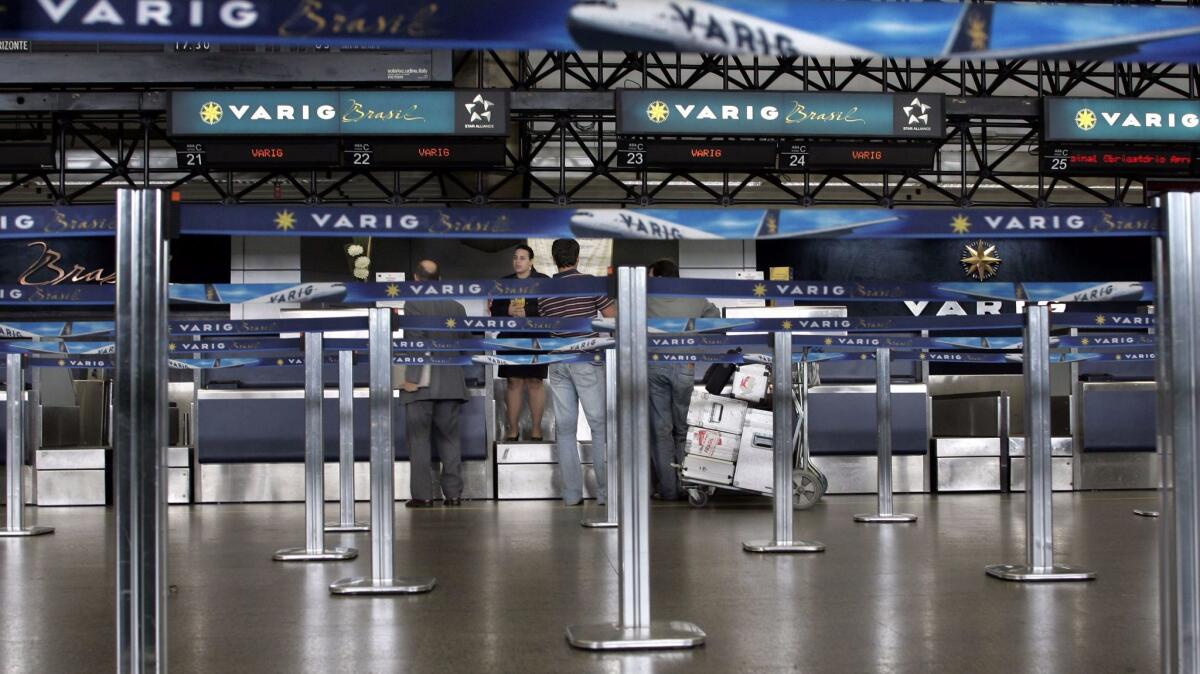The flight attendant did nothing wrong. Still, he was ordered: ‘Pull down your pants’

- Share via
“And now,” said the Brazilian customs agent, “we need you to pull down your pants.”
I stared at him, wide-eyed and disbelieving.
“You need me to do what?”
My eyes shifted to the other customs officer, hoping he would explain that this was just a cruel joke.
Instead, his glare made my stomach churn.
I had been hustled into a detention room at São Paulo-Guarulhos International Airport in Brazil, where I was facing a traveler’s worst nightmare: a customs strip search.
Here’s what happened:
After an eight-hour flight from Miami to São Paulo, our flight crew was met at customs by a cadre of Brazil’s federal police officers and customs agents and members of our airline’s corporate security team.
Apparently, someone on my crew had become the target of a smuggling sting.
Like many South American countries, Brazil has a problem with smuggling in and out of the country. Illegal drugs are the primary contraband sought on outbound flights as passengers head to fertile drug-buying markets in Europe and North America.
But on inbound flights like the one I had just worked from Miami, customs officers look for a different kind of goods: factory-fresh computers, smartphones, tablets, jewelry — virtually anything that can be purchased in the United States, carried in passenger luggage and resold at a profit in Brazil.
Brazil is one of the world’s most expensive countries in which to buy an iPhone. Because of extraordinarily high import taxes, an unlocked iPhone 7 bought for $649 in the U.S. can sell for more than $1,200 at retail outlets in South America’s largest country.
At São Paulo’s airport, all 11 flight attendants and three pilots on my crew were told to roll our bags to the far corner of the customs area, where each piece was meticulously searched. When nothing illegal was found in mine, I thought the worst was over.
The intrusion had just begun.
I was taken to a small detention room where two customs inspectors were waiting.
“We need you to do something,” one of them said matter-of-factly.
I nodded, swallowed hard.
“Pull down your socks.”
I pulled down my socks.
“Now pull down your pants.”
Having done nothing wrong, I refused and crossed my arms defiantly.
The officers said I would be disrobed one way or another, so I unzipped my uniform trousers and let them drop around my ankles. I stood there, trouser-less, waiting for the next command.
“OK, now we need you to drop your shorts.”
“My shorts?”
“I’m sorry,” he said. “But yes.”
Whether you’ve landed in São Paulo, Paris or Los Angeles, airline passengers and crew are powerless to refuse a customs body search. Correction. You’re free to refuse, but the consequences can be ugly. (I know of an airline captain who refused a body search in the U.S. and was slammed to the ground, handcuffed, and searched anyway.)
After a short, contentious standoff in which I ultimately blinked, my boxers came tumbling down. The only thing left between me and total humiliation was my uniform shirt. The shirttails drooped over me like a crinkly white flag at half-mast.
“Now, there’s just one last thing,” one of the officers said.
I shut my eyes and clenched my buttocks.
“We need you to squat like this….”
Through fluttering eyelids I watched one officer hold both arms straight out in front of his body. He then lowered himself so his thighs were parallel to the floor.
Forced to play this repugnant game of Simon Says, I held out my arms, bent my knees and lowered my body.
The two men crouched, craning their necks and staring between my trembling thighs. They watched, shared a look, then watched some more.
After 30 or 40 seconds, I was finally allowed to dress.
I would later learn that customs suspected a crew member was smuggling $20,000 Hublot wristwatches into Brazil. They thought the timepieces had been strapped to his or her body.
Ultimately, my colleagues were cleared of any wrongdoing. But as I stumbled out of that detention room and saw the queue of anxious crew members, I heard the customs inspector say, “Next!”
More to Read
Sign up for The Wild
We’ll help you find the best places to hike, bike and run, as well as the perfect silent spots for meditation and yoga.
You may occasionally receive promotional content from the Los Angeles Times.






